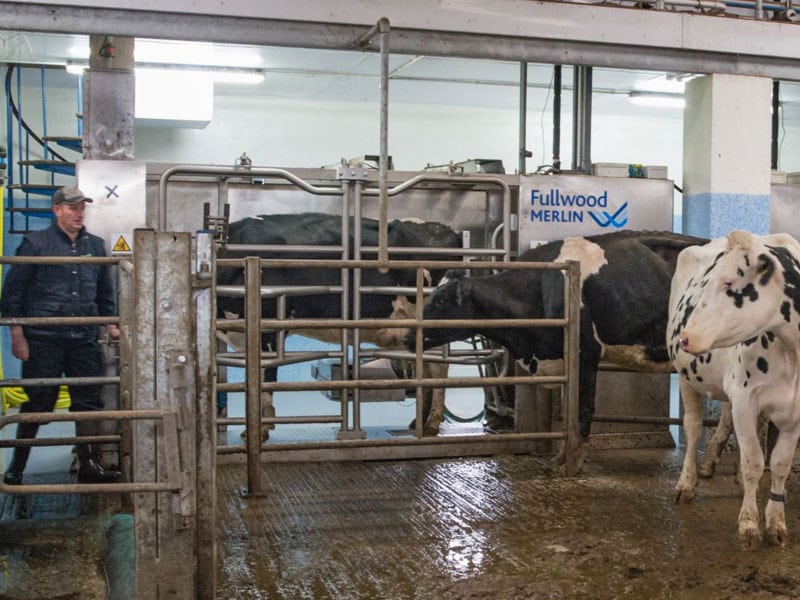Farmer/owner: Stephen and Richard Dark
Farm location: Helston, Cornwall
Farm name: Trudnoe Farm
Herd: 110 cows
Milking system: Two Fullwood Merlin robots
Date of installation: November 2011
Installing two robotic milking machines to work alongside their farm’s traditional herringbone parlour has enabled Stephen and Richard Dark’s Cornish dairy herd to produce more milk from less feed. And with time spent in the traditional parlour cut by 50%, the farm’s staff and cows are all feeling the benefits.
Stephen and Richard Dark farm a total of 500 acres at Trudnoe Farm on the Lizard Peninsula in south Cornwall. With 200 cows in milk all year round, each milking through their 16:16 herringbone parlour was taking up to four hours to complete and putting undue pressure on staff and cows alike.
“Cows were standing too long waiting to be milked and the collecting yard was no longer big enough,” Stephen Dark explains. “Despite spending the last 30 years breeding cows with the potential to produce large volumes of milk, they were unable to achieve their true potential due to the farm’s outdated infrastructure.”
Keen to improve their herd’s yield potential, Stephen and Richard had discussed extending the existing parlour, but concluded that it was virtually impossible to find a satisfactory solution due to a lack of space.
Stephen added “We wanted to move to three times a day milking to make the most of the herd’s genetics, but adding an extra milking would have meant significant changes in terms of staffing requirements and daily routines, and wouldn’t have gone down well with our families.”
The Dark brothers therefore decided to install two robots which milk the herd’s 102 high yielders around the clock.
“If milk prices had been more sustainable over the last few years, we might have opted to install enough robots to milk the entire herd,” Stephen continues. “As it stands, we have installed two robots and are still using the traditional parlour to milk the low yielders and stale cows. In hindsight, the dual facilities suit our system well: the robots are focused on maximising output from the herd’s better performers and we’ve cut in half the time spent in the parlour.
The two Fullwood Merlin robots are milking between 100 and 110 high yielders with each cow being milked an average of 3.2 times per day: the most frequent milkers are achieving 4.8 visits per day. The robot herd is producing an average of 40.5 litres of milk per cow per day with 132 days in milk. In contrast, the parlour group is yielding an average of 22.5 litres per cow per day with 225 days in milk. The herd as a whole is averaging 9,259 litres per year at 4.01% butterfat and 3.2% protein.
By Stephen’s reckoning, the extra daily milking achieved through the robots is worth between five and twelve litres per cow per day. “The high yielders are really thriving,” Stephen adds. “Prior to installing the robots the herd was achieving 8,747 litres per year so we’ve seen a significant increase. It proves that the cows have the will and ability to produce more milk and they have responded positively to the new regime.”
The manual milking regime has also improved. “Previously it took two people four hours to complete each milking. Now, one person can be done and dusted in half the time. We’ve reduced our total man hours and are putting our employed labour to better use by concentrating on jobs outside the parlour which were previously being rushed or not given the attention they deserved.”
The Merlin robots have been installed within the farm’s existing cubicle shed which was extended by 30 feet to provide the necessary space. “We wanted robots with a proven track record and chose Fullwood’s Merlin for exactly that reason. They have proven to be extremely reliable and have revolutionised the way we manage the high yielders: a few months after the robots went live we installed Fullwood’s MerlinView software which lets us keep an eye on the herd from anywhere with internet access. It gives us an at-a-glance summary of the previous 72 hours of milk production as well as a live view of what each robot is doing. Having such detailed information available at the press of a button lets us make better informed herd management decisions, even when we’re away from the cows.”
The Trudnoe Herd has seen fewer incidences of mastitis since the robots went online – thanks to the robots’ backflush system and ability to milk each quarter individually – and Stephen has seen a noticeable improvement in cow demeanour: “The cows are no longer being forced through a system that doesn’t suit them and they have shown they’re happier by producing more milk.
“We’re also using less feed because the robots enable us to feed the high yielders more accurately. We can monitor each cow’s performance on an individual basis and give a precise amount of food according to her daily production status.”
“Our feed consultant, Steve Chapman of SC Nutrition has pointed out, we’ve already yielded an extra 774 litres from forage and we’ve reduced the herd’s total concentrate consumption by 69 tonnes per year. That alone is worth in the region of £15,000 per year.
Stephen summarised “We’re also seeing improvements in terms of improved fertility and reduced calving intervals. If we can continue to improve at a similar rate we’ll be producing even more milk in another 12 months.”
